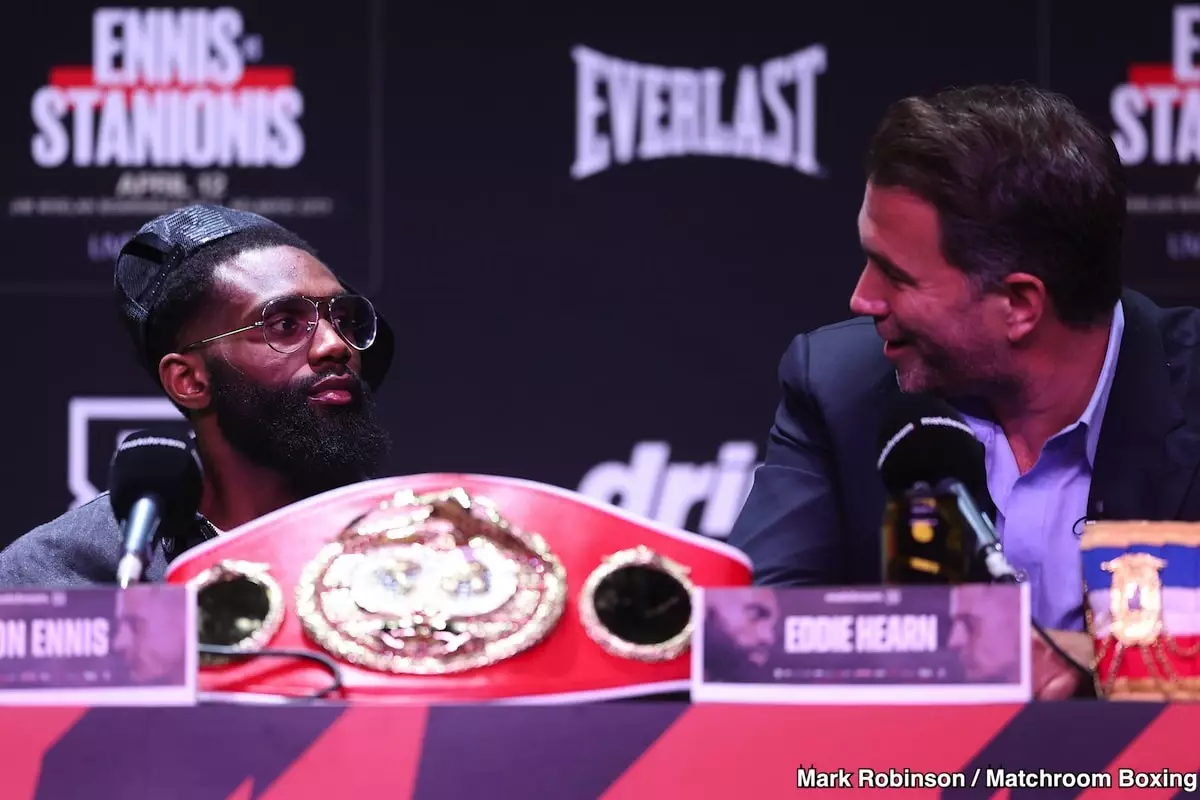In the ferocious world of professional boxing, each decision carries weight beyond the ring—it reverberates through the fighter’s career, reputation, and fan base. One particular incident has recently stirred much discussion in the boxing community: Jaron ‚Boots‘ Ennis’s decision to decline a high-stakes fight against WBC interim junior middleweight champion Vergil Ortiz Jr. Under the scrutiny of commentators like Sergio Mora, Ennis’s choice not only raises questions about his ambition but also reflects on the dichotomy between business and glory in the sport.
A Career-Defining Decision
Ennis, whose record boasts an impressive 33-0 with 29 knockouts, has been vocal about his aspirations, even calling out top-tier fighters like Terence Crawford. However, his rejection of a proposed bout against Ortiz—rumored to be worth up to $8 million—casts a shadow over his intentions. To willingly turn down what many viewed as a career-high payday suggests a level of uncertainty that stands in stark contrast to his earlier bravado. Perhaps the looming presence of his recent lackluster performance against Karen Chukhadzhian influenced this pivotal decision, highlighting an internal struggle within the fighter that is often invisible to his audience.
Public Perception and Fan Loyalty
Boxing, like many elite sports, thrives on its narratives. Fighters are not just athletes; they are storytellers who forge connections with their fans through trials, victories, and defeats. When Ennis turned down the riskier pugilistic encounter with Ortiz, many fans perceived it as a capitulation—an unwillingness to take a high-risk fight that could elevate his status. That is where the narrative takes a turn: instead of being viewed as a strategic decision to protect his career trajectory, this choice colored him as someone ducking a contender. The boxing community isn’t quick to forget perceived cowardice, and the sanctity of pride weighs heavily on a fighter’s legacy.
The Redemption Arc: A Unification Battle
Following the Ortiz debacle, Ennis decided to take on WBA welterweight champion Eimantas Stanionis, a move hailed by some as redemptive. Indeed, Mora suggested that stepping into a unification match—even against a ring-rusty Stanionis—could serve to reinstate Ennis’s credibility. But does this truly erase the doubts left by rejecting the Ortiz fight? Or does it merely serve as a temporary balm for deeper insecurities? The fight against Stanionis, although potentially dangerous, doesn’t carry the same stakes or visibility as the Ortiz clash.
The Ongoing Battle for Legacy
Fighters like Ennis exist in an ecosystem where they are constantly balancing the art of combat with commercial interests. The $8 million offer is not just a financial proposition; it symbolizes the recognition and validation from the boxing elite. Turning it down may have been a safer choice but at what long-term cost? Could this be an acknowledgment of possible weaknesses laid bare by his recent performance? It’s a complex web of psychology that shapes a fighter’s choices and ultimately the trajectory of their career.
Mora’s candid observations reflect a sentiment echoed by many boxing aficionados: the acceptance of a fight against Ortiz would have further solidified Ennis’s claim for greatness in an era filled with buzz-worthy matchups. The missed opportunity against Ortiz, laden with symbolic weight, invited skepticism toward his ambition.
Looking Ahead: The Impact of Choices
As Ennis prepares for his upcoming bout, the repercussions of his earlier decisions will linger. Fans will inevitably watch closely, measuring each jab against their expectations and past disappointments. The question remains: can he recapture their trust? The boxing world is nothing if not forgiving, but it demands authenticity and courage. For Ennis to emerge not just as a contender but as a champion, he must navigate these challenges with astuteness, using every fight not just for victory, but to carve out a legacy that reflects his true capabilities within the ring.


Napsat komentář